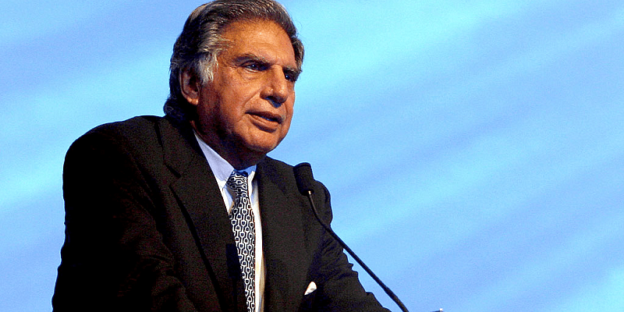Tata Digital, which houses the 153-year-old Tata Group’s digital businesses, has inked three major deals in the last three weeks. Its long-held vision of building a super app might be finally taking shape.
Ratan Tata‘s and Mukesh Ambani‘s residences in South Mumbai are just a few kilometres apart. And now, their digital ambitions, too, are increasingly drawing closer.
As the faces of India’s largest business conglomerates — both valued at over $100 billion — they are gearing up for an exciting face-off that could define India Inc of the 2020s.
Analysts reckon that Tata Digital, which is a fully owned subsidiary of Tata Sons, and Reliance Industries’ digital ambitions could end up creating one of the biggest “duopolies of the decade”.
Over the years, the haloed Tata Group has earned multiple monikers in corporate circles: steel-to-salt conglomerate, cars-to-chemicals behemoth, and so on. This repute has primarily come from offline industries.
But lately, the 153-year-old business’ stunning — and ever-expanding — digital appetite has made India Inc sit up and take note. Tata Digital, which houses the Group’s online businesses, has inked three major deals in three weeks.
These include the $1.2 billion acquisition of India’s largest e-grocer Bigbasket; a $75 million investment in health and fitness startup Curefit; and the acquisition of leading online pharmacy 1mg (deal size undisclosed).
In one fell swoop, Tata Digital has managed to gain a significant presence in India’s internet economy, going beyond its own lifestyle commerce offering, TataCliq.
Mukesh Bansal to shape Tata Digital’s vision
To realise its vision of building a consumer platform that takes on the likes of Reliance, Amazon, and Flipkart, Tata Digital has appointed Mukesh Bansal as President.
Bansal, now the weather-beaten startup general in the Tata Sons camp, comes with a keen understanding of India’s entrepreneurial ecosystem, having built and scaled two successful businesses in Myntra and Curefit, and after playing a critical role in shaping India’s ecommerce narrative in the last decade.
It is believed that Bansal has now been tasked with shaping Tata Digital’s vision of building a super app, which Tata Sons Chairman N Chandrasekharan had first revealed to the media in 2019.
The “next-generation consumer platform” as described by Bansal will aggregate all of Tata Digital’s existing and upcoming online offerings, including grocery, electronics, fashion and lifestyle, payments and financial services, education, healthcare, and travel.
“Tata Digital has a highly inspiring vision to create a next-generation consumer platform and I am very excited to be part of the Tata Digital team that is shaping this vision,” Bansal said in a statement.
This essentially means two things:
a) Tata Digital isn’t done shopping yet, we can expect more deals. It is reportedly in talks to acquire a stake in Google-backed Dunzo as well
b) Tata Digital may be following a playbook similar to that of Reliance.
As for individual sectoral plays, the Tata-BigBasket deal “is bigger and better than what it appears and is important for the industry from a balance of power perspective,” Greyhound Research’s Gogia wrote in a Twitter thread. “It will add muscle to Tata’s broader ambitions around digital, help cross-sell and upsell across portfolio, and maximise wallet value from its existing customer base,” he added.
With India’s online grocery market estimated to reach $24 billion by 2025 (RedSeer report), Tata-Bigbasket will put up a third front to what was, so far, a two-way battle between Amazon and JioMart. It also gives the Tata Group a chance to succeed in what its earlier online grocery service StarQuik failed to do.
Pratik Pal, CEO of Tata Digital, said in a recent statement,
“Grocery is one of the largest components of an individual’s consumption basket in India, and BigBasket [which] is India’s largest e-grocery player, fits in perfectly with our vision of creating a large consumer digital ecosystem.”
Riding on the pandemic-induced growth in digital commerce, India’s total online retail market will be worth $359 billion by 2024, according to Forrester Research.
Both Tata and Reliance know that putting all eggs in one basket is not going to cut it in India’s breathtakingly competitive internet economy.
Hence, scout, buy, and scale. Until you can build.
https://yourstory.com/2021/06/bigbasket-curefit-1mg-tata-digital-ecommerce-reliance-jio/amp





